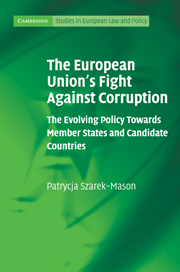 The European Union's Fight Against Corruption
The European Union's Fight Against Corruption Published online by Cambridge University Press: 03 May 2010
to take effective measures for the prevention of corruption and, in this connection, to raise public awareness and promoting ethical behaviour;
to ensure co-ordinated criminalisation of national and international corruption;
to ensure that those in charge of the prevention, investigation, prosecution and adjudication of corruption offences enjoy the independence and autonomy appropriate to their functions, are free from improper influence and have effective means for gathering evidence, protecting the persons who help the authorities in combating corruption and preserving the confidentiality of investigations;
to provide appropriate measures for the seizure and deprivation of the proceeds of corruption offences;
to provide appropriate measures to prevent legal persons being used to shield corruption offences;
to limit immunity from investigation, prosecution or adjudication of corruption offences to the degree necessary in a democratic society;
to promote the specialisation of persons or bodies in charge of fighting corruption and to provide them with appropriate means and training to perform their tasks;
to ensure that the fiscal legislation and the authorities in charge of implementing it contribute to combating corruption in an effective and co-ordinated manner, in particular by denying tax deductibility, under the law or in practice, for bribes or other expenses linked to corruption offences;
to ensure that the organisation, functioning and decision-making processes of public administrations take into account the need to combat corruption, in particular by ensuring as much transparency as is consistent with the need to achieve effectiveness;
[…]
To save this book to your Kindle, first ensure [email protected] is added to your Approved Personal Document E-mail List under your Personal Document Settings on the Manage Your Content and Devices page of your Amazon account. Then enter the ‘name’ part of your Kindle email address below. Find out more about saving to your Kindle.
Note you can select to save to either the @free.kindle.com or @kindle.com variations. ‘@free.kindle.com’ emails are free but can only be saved to your device when it is connected to wi-fi. ‘@kindle.com’ emails can be delivered even when you are not connected to wi-fi, but note that service fees apply.
Find out more about the Kindle Personal Document Service.
To save content items to your account, please confirm that you agree to abide by our usage policies. If this is the first time you use this feature, you will be asked to authorise Cambridge Core to connect with your account. Find out more about saving content to Dropbox.
To save content items to your account, please confirm that you agree to abide by our usage policies. If this is the first time you use this feature, you will be asked to authorise Cambridge Core to connect with your account. Find out more about saving content to Google Drive.